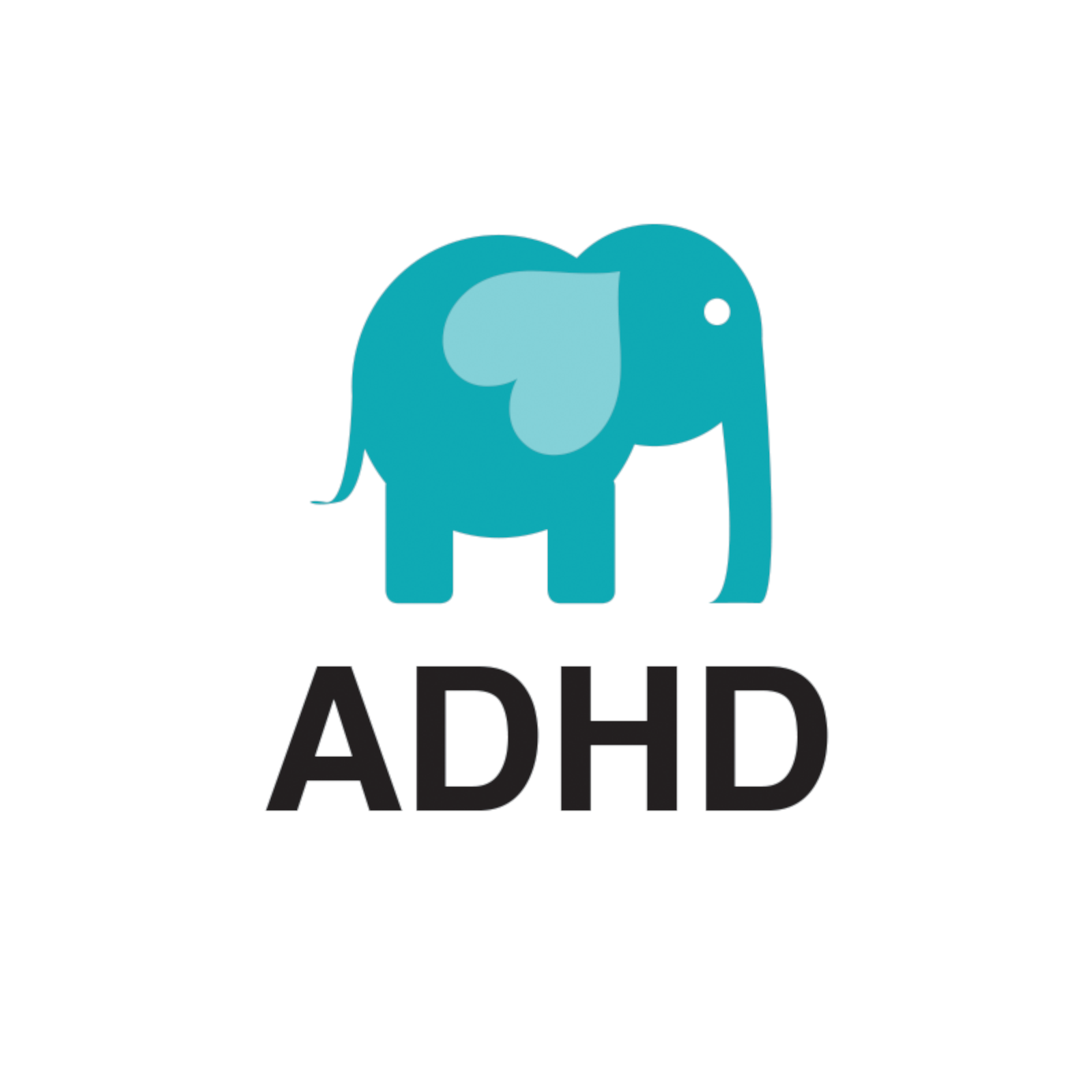
818.5K
Downloads
213
Episodes
Drawing on years of experience working with families, Parenting Coaches Siope Kinikini and Kimber Petersen share how families can improve, heal, and find success using the proven methods of the Teaching-Family Model. Visit smarterparenting.com to learn more.
Episodes
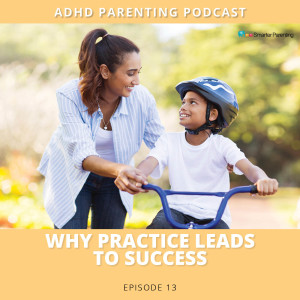
Tuesday Jun 18, 2019
Ep #13: Why practice leads to success
Tuesday Jun 18, 2019
Tuesday Jun 18, 2019
As every actor, musician, or athlete knows, practice leads to success. In today’s podcast, ADHD parenting coach, Siope Kinikini discusses the fifth element of the Teaching-Family Model, Role-playing.
Role-playing is one of the most important, but often overlooked, tool in raising successful kids. Role-playing allows a child to practice new behavior over and over again until they feel confident in handling whatever situation they are placed in. When children have confidence in their ability to handle situations because they’ve practiced it, you’re allowing them to make better decisions and to take responsibility for the decisions they are making.
We offer parental guidance when we encourage our children to practice reading or homework, or piano over and over again so they can master it. Mastering behavior is no different. We can shape new behaviors by Role-playing new behavior.
What happens to the brain when we learn something new is that new pathways are created. The more we repeat the action--whether that’s the piano or Role-playing--the stronger those pathways become until the new action becomes second nature in our brains.
Because children are learning how to navigate the world, they need a lot of practice, especially when it comes to behavior. The Teaching-Family Model is different than other behavior models in that the parent will model the behavior first. This modeling is useful in helping kids navigate life as they see how it’s done and aren’t left to guess what they should be doing. By structuring Role-plays, you are helping your child understand the importance of practicing while keeping them from getting too overwhelmed with all they are learning.
The behavior skill of Role-playing shows you what elements should be included to make Role-plays successful. Visit Smarter Parenting.com to watch the Role-playing skills lesson.
Children don’t always like to practice. Turning Role-plays into a game is one of the best ways to get your child motivated to practice as games and activities don’t always feel like practicing. For example, playing the game Simon Says is a way to Role-play. In the game, you’re practicing both the skill of Effective Communication aka listening and Following Instructions. We'd wager you child wouldn't even recognize that they're Role-playing.
Role-plays don’t have to be huge productions to be successful. What makes Role-plays successful is their repetition.
Remember, practice leads to success!
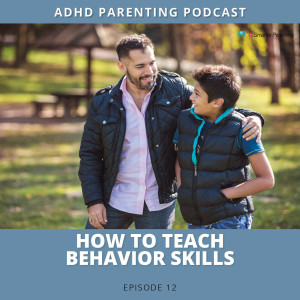
Tuesday Jun 11, 2019
Ep #12: How to teach behavior skills
Tuesday Jun 11, 2019
Tuesday Jun 11, 2019
In today’s episode, ADHD Parenting Coach, Siope Kinikini talks about how quality components are the strength of the Teaching-Family Model and how to teach behavior skills.
We firmly believe that how to teach behavior skills is an individualized process. We want parents and families to find and use what works for them. What works for you to teach your child may not work for someone else. It’s okay to be flexible and to remember that you can make changes.
There are steps that parents as teachers can utilize when it comes to teaching behavior skills so that they get the desired result. Parents need to understand the elements of the Teaching-Family Model before they’re able to teach behavior skills to their child. As a parent, your job is to guide them and encourage them while showing them how to do it.
You are the expert for your child as you know your child the best and how you need to approach teaching behavior skills. You’ve been there through their highs and their lows.
Working with a young child is different than working with a teenager. The elements of the Teaching-Family Model allow you to make adjustments for age difference or when something isn’t working for your child.
Working with your ADHD child will require a different approach, but what you teach them will be the same. The quality component of being able to adjust to your child’s need is what will make you successful. When you adapt your teaching to your child’s need, you are strengthening your relationship as your child will know that you’re concerned with them and their needs.
Part of teaching behavior skills is being aware of your approach. Are you using a pleasant voice? Are you clear in your instructions? Are you giving simple enough instructions? You model the behavior you want in your child. If you want them to be calm, you need to be calm. If you want them to give you eye contact, you need to get down on their level and give them eye contact.
How to teach behavior skills isn’t as scary as you may think it is. We’ve seen other parents do this and have complete confidence that you can do it too!
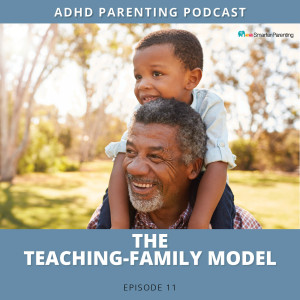
Tuesday Jun 04, 2019
Ep #11: What is the Teaching-Family Model?
Tuesday Jun 04, 2019
Tuesday Jun 04, 2019
What is the Teaching-Family Model is a common question that we get asked frequently? The Teaching-Family Model is an evidence-based behavioral approach that’s been used by professionals and families for over fifty years. It's helped thousands of children and to empower families by teaching them how to be successful.
The elements of the Teaching-Family Model that ADHD parenting coach Siope Kinikini teaches in the ADHD Smarter Parenting Podcasts, have been proven to give parents and tools they need to help their children navigate life in a healthy way.
In the 1960s, a group of psychologists (Elaine and Elery Phillips, Dean Fixsen, Montrose Wolf, Gary Timbers) were interested in how better help troubled children and juvenile offenders in group home settings. They wanted to know what made families successful and if they could replicate what they did.
As they implement specific behavior skills in group homes, they found these children had fewer run-ins with the law, reduced dropout rates, with improved grades and attendance.
They realized they could teach anybody how to be a successful parent by teaching specific behavior skills, and the Teaching-Family Model was born. Utah Youth Village, the parent company of Smarter Parenting, was an early adopter of the Teaching-Family Model. Using the Teaching-Family Model, Utah Youth Village's programs have provided relief and healing to thousands of families.
The Teaching-Family Model shows parents how to best deal with challenging behavior in a way that strengthens, teaches, and builds relationships instead of tearing down relationships.
The Teaching-Family Model views children’s behavior problems as stemming from their lack of essential interpersonal relationships and skills.
The Teaching-Family Model reduces feelings of anger and frustration as it gives you the blueprint for dealing with their behavior. The Teaching-Family Model removes the emotion from the situation. It allows your child take responsibility for their actions as it shows them they have something to gain by improving their behavior.
Thousands and thousands of parents, grandparents, caregivers, and teachers with problems big and small, have used the behavior skills of the Teaching-Family Model to help their child be successful.
Parents have used the Teaching-Family Model because they want to reduce episodes of tantrums, angry outbursts, lying, and fights every time they ask their child to do something. Parents used it because they don’t want to be that parent who screams or yells all the time. Parents use it because they want to feel like they have control. Parents use it because they want their child not to be defined by their diagnosis. Parents use it because they found that it works.
What is the Teaching-Family Model? The Teaching-Family Model is change. The Teaching-Family Model is proven. The Teaching-Family Model works. We know the Teaching-Family Model works because we have seen first-hand its impact on families.
Smarter Parenting is a division of Utah Youth Village. Learn more about the Utah Youth Village and the Teaching-Family Model and how it helps families visit https://www.smarterparenting.com/team/
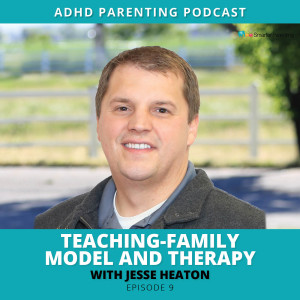
Tuesday May 21, 2019
Ep #10: Teaching-Family Model and therapy with Jesse Heaton
Tuesday May 21, 2019
Tuesday May 21, 2019
The Teaching-Family Model and therapy go hand-in-hand in helping families regain control.
In Episode 10, ADHD parenting coach Siope Kinikini, talks with therapist Jesse Heaton and how he uses Smarter Parenting to help support his ADHD clients.
Smarter Parenting is a division of Utah Youth Village. Utah Youth Village is dedicated to helping families learn the behavior skills of the Teaching-Family Model. Utah Youth Village has changed the lives of thousands of families.
The most effective behavior management plans involve both therapy and behavior skills at home. A therapist will only work with your child for a few hours during a therapy session, and why valuable, they can’t address everything.
Using behavior skills in conjunction with therapy, allows you to continue to address what they are working on at home. It also gives you and your therapist the same language that reduces confusion and ensures that all are on the same page. This can be especially helpful for your child as they know both you and their therapist will be using the same words and instructions.
Therapy helps your child understand what they are feeling and how to express those feelings appropriately.
Often the behavior issues you see at home, your child doesn’t show at therapy. Be open with your therapist about what behaviors you are seeing and what is their triggers. The behavior skills of Effective Communication and Observe and Describe are especially helpful.
Using the Teaching-Family Model and therapy together will bring significant changes as you consistently use the behavior skills with your child at home.
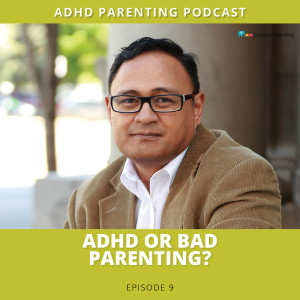
Tuesday May 14, 2019
Ep #9: ADHD or bad parenting
Tuesday May 14, 2019
Tuesday May 14, 2019
As an ADHD parent, one of the most hurtful statements someone can say to you is, “Is it ADHD or bad parenting?” In that statement, whether, it’s a family member, a friend, or a stranger, they minimize the diagnosis of your child and the struggles of parents dealing with ADHD. It makes it feel like you can’t do anything right, and you’re all alone in parenting an ADHD child.
As someone who has ADHD, I find it mind-blowing when someone feels the need to tell me that ADHD doesn’t exist. ADHD is not a “made-up diagnosis.” ADHD is a real disorder that is recognized by the American Psychological Association and comes with real symptoms and behavior. ADHD behavior has been studied since the late 1800s.
To those who say we’ve gone overboard in the ADHD diagnosis, there is some truth in that. An ADHD diagnosis requires a child to exhibit specific behavior and to be diagnosed by a medical professional, but sometimes a parent or a teacher gives a child the “diagnosis” of ADHD. While well-meaning, it serves to bolster the opinion of those who don’t believe that ADHD is real or that it’s just bad parenting.
If you believe your child may have ADHD, it’s essential to make sure they get a diagnosis from a medical professional.
While ADHD behavior can be made worse by inconsistent parenting, bad parenting doesn’t cause your child to have ADHD. Having a child who acts up doesn’t make you a bad parent (though we know there are days when you feel like it does).
The reason many believe ADHD is due to bad parents is that the symptoms of ADHD make ADHD discipline more difficult. ADHD children don’t always behave in like other children.
The parenting skills we reference in these podcasts will help you handle your child’s behavior in a positive way. As you feel confident in your ability to manage your child’s behavior, you’ll be better prepared to handle the hurtful comment of “Is it ADHD or bad parenting?”
Parents dealing with ADHD don’t need the blame game. They need people to believe them. They need support. They need resources. Parenting an ADHD child requires you to become an advocate for your child and to help bring ADHD awareness to family and friends on what ADHD behavior and diagnosis mean.
Subscribe to the ADHD Smarter Parenting Podcast.
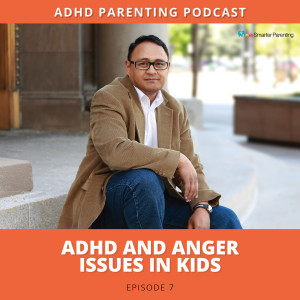
Tuesday May 07, 2019
Ep #8: What ADHD parents don't need to hear
Tuesday May 07, 2019
Tuesday May 07, 2019
In podcast #8, ADHD Parenting Coach, Siope Kinikini, discusses five things that ADHD parents don’t need to hear.
We know receiving unsolicited advice is a problem for many ADHD parents. It seems as soon as someone knows your child has ADHD the comments start. “Don’t worry; they’ll outgrow ADHD.” “They don’t have ADHD; they’re a troublemaker.” “Your child gets unfair advantage because of ‘ADHD.’” Or “I’m sure it’s not as bad as you say it is.”
In many cases, the person making the comment doesn’t understand the devastating impact their words have. They think they’re being helpful or supportive. In reality, they’re doing the opposite. They’re making ADHD parents feel judged, isolated, and overwhelmed.
When speaking to a parent of ADHD child, please don’t say the following five things to them.
First, ADHD doesn’t exist. Second, Everybody has ADHD. Third, ADHD is new, and now everybody has it. Fourth, I would never medicate my child. Fifth, ADHD is an excuse for bad parenting.
First, ADHD doesn’t exist. This is hurtful to parents because it does exist, and many parents would rather their child didn’t have ADHD. To get an ADHD diagnosis it has to be diagnosed by a medical professional, the child has to meet specific criteria, and it’s a lengthy and rigorous process to get a diagnosis as other issues have to be ruled out.
Second, everybody has ADHD. When you say this, it minimizes the struggles that parents and child face when dealing with ADHD. Like any other diagnosis, ADHD exists on a scale from mild to severe. Your experience with ADHD may not be the same as other parents. You may have a mild form of ADHD that was reasonably easy to handle, but that may not be the case for every parent you’re talking to.
Third, ADHD is new, and everybody has it. ADHD has been around for a long time and has a lot of research into what it is and the best ways to treat it.
Fourth, I would never medicate my child.
This statement is full of judgment and may come across that you’re better than they are. The decision to medicate a child isn’t taken lightly and often comes at the recommendation of the child’s physician as medication may be the best course for that child.
Fifth, ADHD is an excuse for bad parenting. There is never a time or place for this statement. When you say this to a parent, you’re essentially telling them that they’re inept and not able to be a good parent. Which can be devastating to a parent who is doing everything they can to help their child. Remember that ADHD is a medical diagnosis, much like cancer is.
What ADHD parents need is someone to be a listening ear. They need someone to encourage them and to be there for them. They are already struggling with feelings of failure and inadequacy, and hurtful comments don’t help. You don’t understand the challenges they may be facing in raising their child.
Remember that ADHD parents don’t need to hear negative comments. Parenting is hard enough, so please, please be kind when talking to any parent.
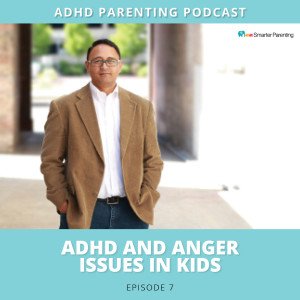
Wednesday May 01, 2019
Ep #7: ADHD and anger issues in kids
Wednesday May 01, 2019
Wednesday May 01, 2019
ADHD and anger issues often go hand in hand, and dealing with it is a significant stress for most parents. ADHD Parenting Coach, Siope Kinikini, helps parents understand the real reason behind their child’s anger and gives ADHD strategies for dealing.
How to deal with a child with anger issues is a question that Siope is frequently asked. Parents want to know how to deal with the situation without it blowing up even more. But more than that, they want to know how to reduce future episodes of ADHD and aggression by doing things that help diffuse the situation instead of inflaming it.
The best way to deal with anger issues to understand what is happening in your child’s body when they are angry. The ADHD strategy that has worked well for countless families is to know why we get angry. We get angry because what you want or hoped for didn’t happen the way you wanted it to happen. Think about that. Anger stems because someone’s behavior or actions didn’t go how we wanted them to go, and we become frustrated.
Understanding anger means understanding how you arrive at that emotion. This understanding is crucial when talking to your child with ADHD. Most ADHD children are already working on something that has a level of frustration for them. What do we mean by this? Your child may already be working on sitting still, paying attention, not talking, focusing on what is being said. They know they need to work on these things as they're constantly being told. They’re already feeling anxious and frustrated as they’re trying hard to fulfill what we’ve asked them to do and they’re struggling to do it. So when we add another instruction on that, bam, they’re even more frustrated, and that frustration often manifests as anger.
While we may look at a small instruction as “no big deal.” It’s a “huge deal” to them. It means that they’re feeling anger/frustration on multiple things and the last instruction happened to be the instruction that pushed them over the edge.
Understanding this principle will help you be able to teach them about what is happening with their body and how to deal in a more positive way when an expectation isn’t met. Disappointment is part of life, but our goal is to teach them how to deal with ADHD anger management in a better way.
The problem most parents face is being able to break down complicated feelings or ideas so that their children understand. This knowledge is especially difficult with very young children. It is why breaking things down into small instructions is important. It helps them not feel overwhelmed and frustrated. How to calm a child with ADHD who is in the middle of an angry outburst it to remember three things. First, remain calm as it will help to deescalate the situation. Second, stay focused. Third, be consistent.
ADHD and anger issues are manageable if you apply the ADHD strategies learned in this podcast.
Join the Smarter Parenting Club and we can help you with individual strategies for dealing with your child's anger. https://club.smarterparenting.com/
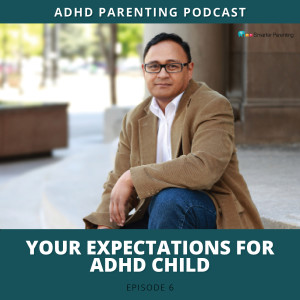
Wednesday Apr 24, 2019
Ep #6: Your expectations for ADHD child
Wednesday Apr 24, 2019
Wednesday Apr 24, 2019
I hear from parents how difficult parenting ADHD child is. They tell me that they want their child to be normal and successful. Instead, they feel judged, isolated, frustrated, overwhelmed, and often, like they’ve failed their child.
Parents, I can not say this loudly enough; you are not failing your child. Your stress, worry, and frustration is evidence that you are doing your best to help them.
Raising a child who has been diagnosed with ADHD requires a mind shift. If you have the same expectations for your ADHD as you do for your other child, you are setting yourself up for failure. It’s normal to want your ADHD child to act, think, and behave a certain way, but the truth is they won’t. That disconnect between how you want them to act and how they act is where that isolation, frustration, and exhaustion starts.
All parents have unrealistic expectations for their child. That is completely normal. As a parent, our expectations for ADHD child is that expect them to be “just like everybody else” that we aren’t able to meet them where they are.
What do we mean by that? It means that we need to take a step back and have realistic expectations based on their ability. Instead of wanting our child to sit still for 30 minutes and become frustrated when they don’t, we set an expectation that is achievable for our child. Which may only be 2, 3, or 10 minutes. When our child becomes restless after 2,3, or 10 minutes we don’t become all stressed and upset. That was what we expected they’d do, and we’re already prepared to handle it.
We’re telling you not to have expectations, instead, we’re wanting you to focus on helping your child move forward and improve where they’re at now. It’s meeting them at their level. We talked in greater detail about changing our thoughts in episode 1. We recommend you listen to it if you’re having trouble changing expectations for your ADHD child.
How to help a child with ADHD is to not compare them to other children and to focus on having realistic expectations of what they can do. As you believe in them and meet them where they are at, you are giving your child the tools they need to be successful as they will feel less judged and less pressure to be something they’re not.
By empowering ADHD parents with the mind frame to change the expectations for ADHD child, Siope Kinikini shows families how they can heal.
Visit the ADHD Smarter Parenting Podcast homepage: https://www.smarterparenting.com/adhd-parenting-podcast/
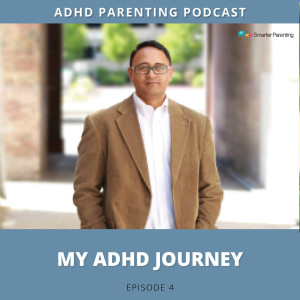
Tuesday Apr 09, 2019
Ep #5: ADHD strategies for kids with Tanya Stevenson
Tuesday Apr 09, 2019
Tuesday Apr 09, 2019
Today you’re in for a treat as professional parent Tanya Stevenson shares the ADHD strategies she has used in working with challenging children. As a professionally trained parent in a group home setting, Tanya and her husband have parented countless kids with severe ADHD behavior. She’s dealt with hours-long tantrums and knows the frustration of kids not wanting to do their chores or get up in the morning. She 100% supports your caffeine addiction and believes it’s important for parents to have ADHD coping skills.
Many would say she’s crazy for continuing working with ADHD children, but she’s seen the success and long-term changes children can make because of the behavior skills of the Teaching-Family Model.
You don’t have to be a professional parent to learn to parent like one. Let that sink in. You can learn to be the best possible parent to your ADHD child when you put in the time and effort into learning behavior skills that will make a difference.
Like we referenced in podcast #1, ADHD interventions require you to change your expectations. We recommend going back and listening to it. For example, when working with ADHD kids, your new expectation may be giving your child 100 instructions instead of 10. Mentally preparing for 100 allows you not to get frustrated at number 11, or 68, or 83, or 99.
When you switch your expectations, you are focused on helping your child learn. It will take patience and effort, but implementing ADHD strategies will have great pay-offs.
No one is born knowing exactly how to parent. Join Siope and Tanya as they talk about how to deal with ADHD in a healthy and positive way by utilizing ADHD strategies that will empower you to be the best possible parent.
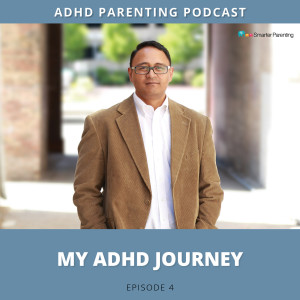
Sunday Apr 07, 2019
Ep #4: My ADHD journey
Sunday Apr 07, 2019
Sunday Apr 07, 2019
There is hope at the end of the tunnel for kids with ADHD. ADHD Parenting Coach, Siope Kinikini, shares his journey with ADHD. When you’re dealing with challenging ADHD behavior, it can be hard to believe your child can be like others. An ADHD diagnosis seems isolating and stressful.
Siope was diagnosed with ADHD as a child in elementary school. Siope knew something was different when he couldn’t function like other in elementary school. Parent-teacher conferences were difficult for his parents as his teachers constantly harped on his inability to focus and function and labeled him defiant and lazy. Getting told these things from adults made it hard for him to build self-esteem and enjoy the learning process in school. Based on what he was hearing, he didn’t think he’d be successful, and that was difficult.
In college, he learned to view his ADHD as strengths and to harness those strengths. In college, he learned particular skills that allowed him to manage his ADHD and set goals that he could accomplish. He has continued to find long-term success as he’s managed his ADHD.
While many see ADHD diagnosis as a bad thing, Siope saw it as a blessing. Join Siope as he shares his experience with ADHD and gives you the hope that you can be successful in your ADHD parenting.
For full show notes and transcript visit: https://www.smarterparenting.com/my-adhd-journey/
